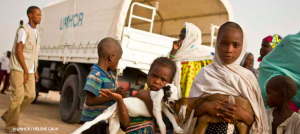by Michelle Wolf
At the end of every month, my husband and I go over our budget for the month ahead. We allocate an agreed upon amount of money for groceries and attempt to keep track of how much we use in electricity and gas. Every other week, we withdrawal money from our bank account to pay for groceries, which we tend to buy in bulk, at a nearby Costco. It’s easy for us to justify spending hundreds of dollars on groceries every month because we have reliable jobs at stable companies where we are paid a generous income. We can confidently rely on our employers to pay us on time and in full. We can pay for the gas that powers our cars and house. We don’t carry an ax with us to chop down wood in preparation for this year’s upcoming Minnesota winter. Our home will be warm and our kitchen will be stocked with food.
In Niger, more than 1.5 million people do not have enough to eat and 50% of households do not have a source of income. In Diffa, food and income are astonishingly difficult to maintain. Turmoil from Boko Haram, stresses from the influx of refugees and internally displaced persons, security, trade and crop restrictions, and lack of clean water impede access to food and economic growth.

The UN Refugee Agency (UNHCR) and RRRP Partners have set up programs at refugee camps to help aid in food assistance and introduce gas as the main source of household energy.
Gas energy is needed in areas where reliance on wood energy and excessive cutting of wood is further deteriorating the environment. All new households in refugee camps will be supported with gas energy, and 5,000 existing households, outside of the camps, will be provided with gas stoves and cash transfers for the purchase of gas.
Humanitarian agencies like UNHCR and Wells Bring Hope, help provide an environment that allows Nigerien communities to prosper. Taking steps to assist in obtaining basic human needs creates a sort of snowball effect. Once basic, physiological needs are met, communities can direct their resources to satisfying higher-level needs. As Maslow outlined, before individuals can fulfill their highest potential, basic needs like water, food, and shelter must be satisfied. With these stepping stones in place Nigeriens can begin to feel safe in their environment and begin to work toward building lives that allow them to pursue their dreams.


